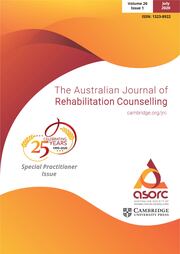Article contents
The Effect of Task-Specific Self-Efficacy on Stages of Change of People With Substance Abuse Problems
Published online by Cambridge University Press: 15 October 2015
Abstract
The objective of the study was to determine the effect of task-specific self-efficacy on stages of readiness for change among people with substance abuse problems. Participants were 140 men and 33 women with substance abuse problems receiving services in outpatient therapeutic community service programs. The Stages of Change Scale-Substance Abuse (SCS-SA) was the outcome measure. People with substance abuse problems receiving outpatient treatment services can be meaningfully classified into four stages of change groups: (1) Precontemplation, (2) Inactive, (3) Ambivalent-Conforming, and (4) Participation. Readiness for change is related to self-efficacy in work-related skills and risk-avoidance skills. Task-specific self-efficacy is related to stages of change. The findings of this study suggested that providing skill training to enhance task specific self-efficacy can help people with substance abuse problems progress from lower level to higher level of stages of change.
- Type
- Articles
- Information
- The Australian Journal of Rehabilitation Counselling , Volume 15 , Issue 2 , 01 November 2009 , pp. 63 - 73
- Copyright
- Copyright © Cambridge University Press 2009
- 3
- Cited by




